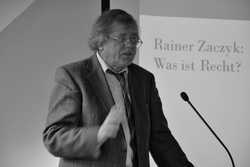Prof. Dr. Rainer Zaczyk
Rhenish Friedrich-Wilhelm University of Bonn
Curriculum Vitae
- 1951 born in Alzenau/Lower Franconia
- 1970 Abitur
- 1970 – 1975 studies in Frankfurt
- 1975 first state examination in law
- 1978 second state examination in law
- 1978 – 1983 Research Assistant with Prof. Dr. E.A. Wolff, Frankfurt
- 1980 Dr. jur. Frankfurt
- 1983 – 1984 habilitation stipend recipient by the DFG
- 1984 – 1988 research employee in Frankfurt
- 1987 Habilitation in Frankfurt; venia legendi for the subjects of Criminal Law, Criminal Procedural Law and Philosophy of Law in Trier
- 1996 – 1997 dean of the Faculty of Law of the University of Trier; senate member
- 2002 Chair for Criminal Law and Philosophy of Law at the University of Bonn, managing director of the legal-philosophical seminary
- Fellow at the Käte Hamburger Center for Advanced Study in the Humanities “Law as Culture” from April to September 2011
Research project
Selbstsein und Recht (self-being and law)
My time as Fellow at the Käte Hamburger Centre for Advanced Study "Law as Culture" will be dedicated to a project entitled “self-being and law” (Selbstsein und Recht), which has absorbed me for a while. A theory of self-awareness is to be developed (within the philosophical meaning of the term, i.e. the reason and object of self-determination), which derives its genesis from a fundamental interpersonal relationship. The development shall occur with a view to law and thus, at its core, with a view to the resulting external relationship to another person. By taking this approach, it can be excluded from the outset that the concept of autonomy, synonymous to self-awareness, solely and necessarily take the shape of (“western”) individualism, to which sociality with others still needs to be added; for individuality is inconceivable without reference to the other. If one proceeds to integrate cultural traditions and ways of life into this relationship, “self” and “law”, “autos” and “nomos” can be brought into an open connection, and different forms of self-being and, as a corollary, different forms of legal cultures, become explainable. This shall be put to the test by examining Buddhist and Confucian thought, as well as their respective conception of order. Dealing with the question to which extent Islam should also be included, will form part of the research project. The ultimate objective is to prove that a conception of law, so construed, does not merely call for the recognition of different legal cultures, but is inherent to its diversity. The principle of law then manages to both think and, at the same time practice, difference and unity. – Seeing as substantial preparatory work has already been conducted, I hope to have the book “Selbstsein und Recht” ready for publication by the end of the research period (September 2011).
(Selected) Publications
- Das Strafrecht in der Rechtslehre J. G. Fichtes, Berlin 1981 (Schriften zur Rechtstheorie, H. 96).
- Kahlo/ Wolff/ Zaczyk (Eds.): Fichtes Lehre vom Rechtsverhältnis, Frankfurt/ M. 1992.
- Zur Einheit von Freiheit und Sozialität, in: Gedächtnisschrift für Meinhard Heinze, München 2005, pp. 1111 sqq.
- Freiheit und Recht – Immanuel Kant zum 200. Todestag, Juristische Schulung 2004, 96 sqq.
- Die Freiheit der Person als Zentrum der Rechtsbegründung, in: Siller/ Keller (Eds.), Rechtsphilosophische Kontroversen der Gegenwart, Baden-Baden 1999, pp. 51 sqq.
- Über Begründung im Recht, in: Festschrift für E. A. Wolff, pp. 509 sqq.


